
views
Developing a Positive Attitude Towards Your Condition
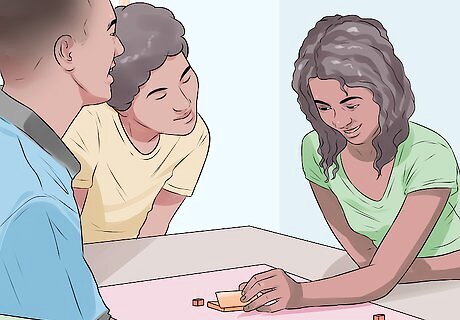
Work with your illness. Your illness may make it difficult to do every activity that you want to do. This doesn’t mean that you can't spend time with your family or friends. Find things to do with your family and friends that work with your illness. For example, you may not be able to go hiking or walk around a busy city all day due to your chronic pain. Instead, you can go on a sightseeing bus or boat tour, spend the day at a lake picnicking or fishing, or arrange a day at home where you play board games. Ask your family and friends, “Can we do something different? My illness won’t allow me to do what you’ve planned, but we can do something else and have a good time.”

Surround yourself with supportive people. There will be people in your life who will support you and those who will always be negative about your condition. Try to distance yourself from those in your life who are not supportive. Instead, spend time with those who understand your condition and still treat you like a person. You have limited energy and emotional resources. You want to make sure you are placing your time and energy on people who are worth it. For example, if you have chronic fatigue syndrome, people may not support you because it is a condition with symptoms they cannot see. CFS leaves you feeling drained and tired much of the time, so you don't want to waste your energy on people who are not supportive of you and your condition.

Find ways to focus on the happy things. Try to find happiness around you. You may feel negative or down due to your illness, but focusing on small things that make you happy can help you cope. Think about what makes you happy. Cultivate those interests and find ways to include those things in your life. For example, if you love to read but have MS, you may want to try large-print books or audiobooks if you get fatigued when reading. If you used to play a musical instrument but have a neurological disease, spend time listening to music. Your illness may require you to readjust the way you think and do things. If you think outside of the box and more positively, you will be able to figure out ways to bring happiness into your life.
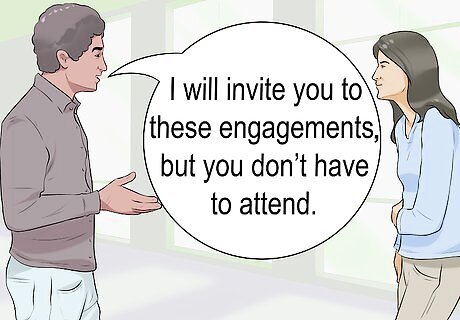
Ask your loved ones to be understanding about your limits. For people with invisible illnesses, getting out of the house and being active can be very difficult. Though you would love to go to every dinner or party you are invited to, that is not always an option. Discuss with your loved ones that you have limits and that you would like them to respect those limits. For example, you may only be able to attend one dinner a month or one every six months due to chronic fatigue syndrome, MS, or depression. Let your loved ones know that doesn’t mean you don’t care about them. Tell your loved ones that it is helpful for them to say things like, “I will invite you to these engagements, but you don’t have to attend. I will be happy when you do come, but there is no pressure. I understand your limits.”
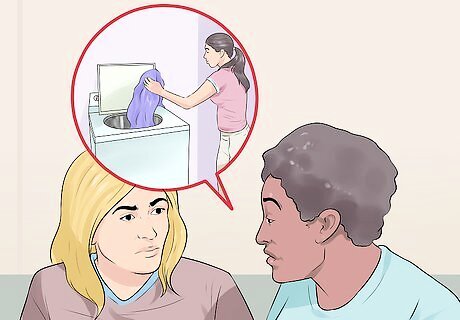
Ask for help. You may experience times when you need to ask for help. You have limited energy and may not be able to get everything done each day. If this is the case, you may want to ask your loved ones for help with small things. For example, if a friend or family member is going to the grocery store, you may want to ask them to pick you up a few things. If you live with others, you might ask them to do a load of laundry or load the dishwasher on days when you have limited energy.
Dealing With Negative Feelings
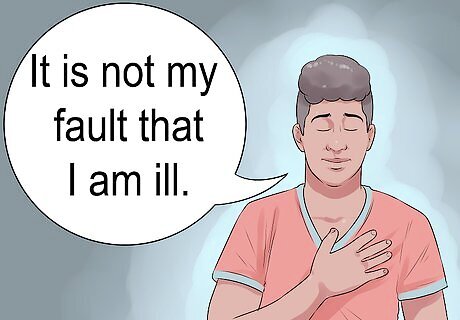
Remind yourself it’s not your fault. Because of the nature of invisible illnesses, some people start feeling like they are responsible for their sickness or are making it up. This leads to thoughts that you should be able to “get over it” and get better. Though you may look fine on the outside, your illness is real. This may be especially true if you have conditions like depression or mental illness, IBS, CFS, or migraines. Some people may think these are not real conditions and that you can control your symptoms. Tell yourself, “It is not my fault that I am ill. I cannot make myself better. I have a very real disease, and that’s okay.”

Try not to feel embarrassed. When you are around your family and friends, you may feel guilty or embarrassed about your condition. You may not be able to to do the same things that they can, which can cause negative feelings. Remember that your illness is valid, so you should not feel guilty. Whenever you feel embarrassed or guilty, remind yourself, “This is not my fault. I have nothing to be embarrassed or guilty about.”

Accept that people may not accept the condition. Despite your efforts to educate others and explain what you go through, some people may never think that you are sick. They only will believe something they can see with their own eyes. Remember, this is not your fault. You cannot change the way someone thinks. Try your best to explain and educate them, but if they won’t accept it, let it go.
Helping Your Loved Ones Know How to Respond

Explain to your family and friends how to react. Many family members and friends want to help and be supportive when you have an invisible illness. If they are unsure how to help, tell them. Let them know what you need from them and how they can be supportive. Help your family members and friends understand they should drop all assumptions about your invisible illness. This can lead to condescending comments and a lack of understanding. Encourage your family and friends to approach you with an open mind. You may tell them how to compliment you without trivializing your illness. For example, they may say, “You look great today. I’m sorry you don’t feel well,” or, “I’m sorry you don’t feel as good as you look.” Let them know that they can compliment you by saying, “Your hair looks nice,” or, “I like that outfit.” They don’t always have to mention your illness.
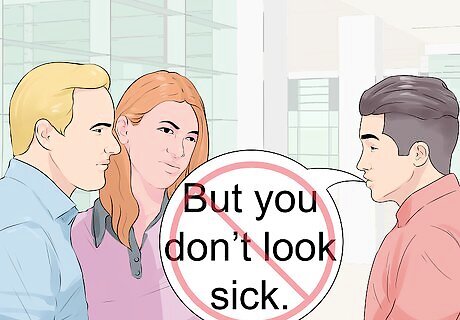
Help your loved ones learn what not to say. Though your friends and family may mean well, they may not know how to talk about the subject, how to treat you, or what to say. This may lead to them saying or doing something that hurts you. Point out to your loved ones how things they say are offensive and hurtful. For example, tell your loved ones not to say things like, “But you don’t look sick,” “It’s all in your head,” “It could be worse,” or “Wouldn’t you feel better if you got out more/did more/were more active?” All of these things can be very hurtful. Help them realize that trying to tell you how to “cure” yourself or “treat” your condition belittles your condition. Say to them, “I am aware of treatment and management options for my condition. My doctor and I work very closely together. I can explain my management plan to you if you would like.” For example, people often think depression can be "cured" by getting out or thinking positively. They may think you can cure your CFS with more sleep or that IBS is in your head. These assumptions can be very hurtful.

Educate yourself and others about your illness. Many people only believe illness is something they can see. This means they might not know or understand your condition. To help yourself cope, first educate yourself about your disease. This can help you understand more about your condition and help you know how it affects your body even though it’s invisible. You should also help educate those around you about your illness. Give your condition a name for people so they associate the way you feel with a name, even if it’s chronic pain. Explain the symptoms to your family and friends. Since there are no visible symptoms, help them understand what is going on inside your body. Tell your family and friends about treatment options and management strategies.
Seeking Professional Help

Create a management plan with your doctor. There are many different invisible illnesses. You can’t treat each one the same. To help with this, you should work closely with your physician to develop a management plan. This can help management symptoms, pain, and fatigue. For example, Multiple Sclerosis, depression, Irritable Bowel Syndrome, and chronic pain are common invisible illnesses. Treating and managing each one is different. The management for the same illness also varies from person to person. This is why it is important for you to work closely with your doctor to develop a personalized treatment plan.
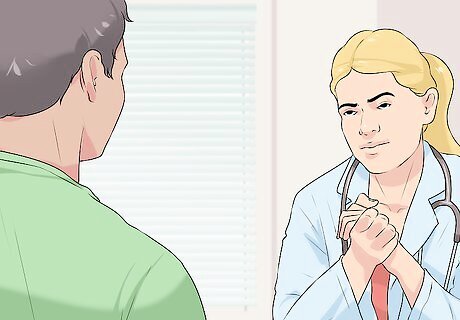
Find a doctor who believes you. People who suffer from invisible illnesses sometimes end up with doctors who do not believe they are sick. The doctor may believe your symptoms are in your head or that you are trying to get pain meds. Stop seeing doctors who think like that and find a doctor who will believe you. Finding a doctor who believes that you are ill ensures that you receive proper treatment. Start by looking for doctors in your area that specialize in your condition. You may also want to visit official illness web pages, message boards, and forums to ask for suggestions of doctors in your area.

Talk to a counselor. You should to talk to a mental health professional who can help you learn coping strategies for your invisible illness. Invisible illnesses can lead you to many negative feelings, like depression or self-doubt. Your self-esteem can be impacted as well. Sometimes these illnesses have a psychosomatic element. That is not to say you are faking your illness or that it's "all in your head," but that it may be connected to a psychological and/or emotional condition. Addressing these components may help alleviate some of your symptoms. A mental health professional can listen to your concerns and help you find ways to accept your limits, deal with others, and manage negative feelings.
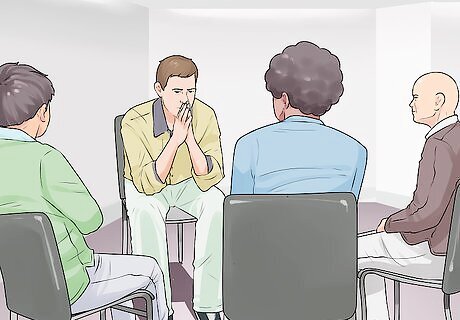
Find a support group. Living with an invisible illness can be difficult. To help you cope, you may want to find a support group of others with your illness or an invisible illness. This may be a group in your area or one online. Ask your doctor or local hospital if they know of a support group that meets in your area. You may want to find a group online. There are many websites dedicated to invisible illnesses or specific conditions. You may be able to find an online support group through them.




















Comments
0 comment